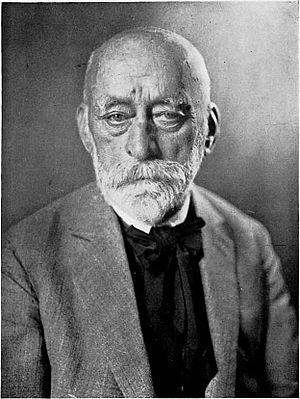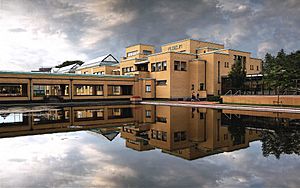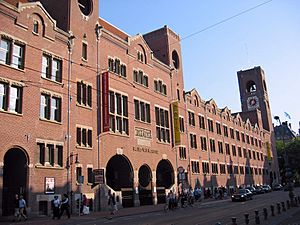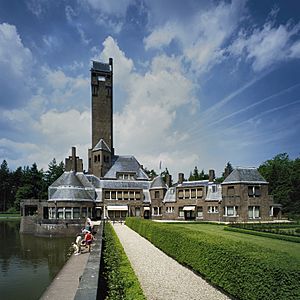Hendrik Petrus Berlage facts for kids
Quick facts for kids
Hendrik Petrus Berlage
|
|
|---|---|
 |
|
| Born | 21 February 1856 Amsterdam, Netherlands
|
| Died | 12 August 1934 (aged 78) The Hague, Netherlands
|
| Nationality | Dutch |
| Alma mater | ETH Zurich |
| Occupation | Architect |
| Buildings | Beurs van Berlage (1903) Jachthuis Sint-Hubertus (1920) Kunstmuseum Den Haag (1935) |
| Projects | Plan Zuid (1915) |

Hendrik Petrus Berlage (February 21, 1856 – August 12, 1934) was a very important Dutch architect. He is often called the "Father of Modern architecture" in the Netherlands. His ideas helped shape many different styles of Dutch architecture in the early 20th century.
Contents
Early Life and Education
Hendrik Petrus Berlage was born in Amsterdam, Netherlands, on February 21, 1856. He studied architecture at the Zurich Institute of Technology in Switzerland from 1875 to 1878. After finishing his studies, he spent three years traveling around Europe. This travel helped him see many different types of buildings and get new ideas.
Starting His Career
In the 1880s, Berlage started an architecture business in the Netherlands with Theodore Sanders. Together, they worked on many different building projects. Berlage also wrote books about architecture and was part of several important groups for architects.
Berlage's Architectural Style
Berlage's style was unique and influential. He was inspired by architects like Henry Hobson Richardson, who used a lot of brickwork. He also liked how some buildings combined iron structures with brick.
Key Ideas in His Designs
Berlage believed that buildings should show their structure clearly. He often used bare brick walls that carried the weight of the building. He also thought that the space inside a building was very important, and that walls helped create the shape of that space. These ideas were central to a Dutch architectural style known as 'Hollandse Zakelijkheid', which means 'Dutch Objectivity'.
Influence from America
In 1911, Berlage visited the United States. This trip had a big impact on his work. He was especially impressed by the "organic architecture" of Frank Lloyd Wright, a famous American architect. When Berlage returned to Europe, he gave lectures that helped spread Wright's ideas in Germany and other countries.
Notable Buildings and Projects
Berlage designed many famous buildings. Some of his most well-known works include:
- The Beurs van Berlage (Amsterdam Stock Exchange) in Amsterdam, completed in 1903. This building is a great example of his brickwork style.
- The Jachthuis Sint-Hubertus (St. Hubertus Hunting Lodge) in Hoge Veluwe National Park, finished in 1920.
- The Kunstmuseum Den Haag (Art Museum of The Hague), completed in 1935.
He also worked on large city plans, like the Plan Zuid (Plan South) in Amsterdam, which was a major urban expansion project started in 1915.
International Work
Berlage also designed buildings outside the Netherlands. One example is the Holland House in City of London, built in 1916. It was an office building for a Dutch shipping company.
Legacy and Influence
Berlage is seen as a bridge between older, traditional architecture and newer, modern styles in the Netherlands. His ideas inspired many Dutch architectural groups in the 1920s, including:
- The Traditionalists
- The Amsterdam School
- De Stijl (The Style)
- The New Objectivists
In 1932, he received the British RIBA Royal Gold Medal, a very important award for architects.
Berlage passed away on August 12, 1934, in The Hague. His son, also named Hendrik Petrus Berlage, became an astronomer. A lunar crater on the Moon is named after his son.
Continuing His Legacy
The Berlage Institute was founded in 1990 as a special school for architecture students who have already finished their first degree. This institute continues to explore and develop ideas in architecture, much like Berlage did.
Many of Berlage's works are kept in public collections at museums like Museum de Fundatie, Gemeentemuseum Den Haag, and Kröller-Müller Museum.
See also
 In Spanish: Hendrik Petrus Berlage para niños
In Spanish: Hendrik Petrus Berlage para niños
 | Jackie Robinson |
 | Jack Johnson |
 | Althea Gibson |
 | Arthur Ashe |
 | Muhammad Ali |



